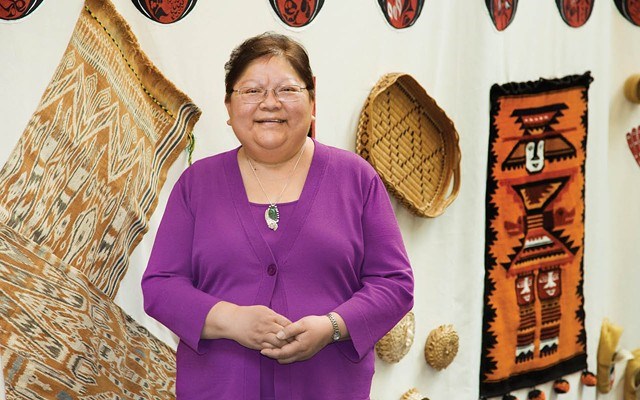A Lil'wat Nation woman who has been a tireless champion of Indigenous language revitalization for the past half decade has been awarded one of Canada's highest honours.
Dr. Lorna Wanosts'a7 Williams has been awarded the Order of Canada for her contributions to Indigenous education and her advocacy of Indigenous language revitalization programs. She was appointed as an Officer of the Order of Canada by the Governor General of Canada in an announcement made on Dec. 28, 2019.
Williams said that she hopes that the distinction sheds light on the important work of language revitalization.
"It's not just for me," she said. "It's for the work."
Over the years, Williams has played a crucial role in the Lil'wat Nation's efforts to strengthen Ucwalm铆cwts, the traditional language spoken by the Lil'wat and other St'at'imc Nations.
In the early 1970s, Williams helped establish Mount Currie's band-controlled school (the second such school in the nation).
She also helped develop a writing system for Ucwalm铆cwts, and co-authored the first curriculum and learning resources that were used to teach the language in the school.
Her journey is all the more remarkable given that Williams' effectively lost her ability to speak her language when she was sent to St. Joseph's Mission in Williams Lake, a residential school, as a child.
Williams was able to relearn the language when she returned to Mount Currie thanks to family and community members who taught her.
Given the difficult history Canada and its Indigenous populations share, Williams said she feels a degree of ambivalence about accepting the Governor General of Canada's recognition.
"I do [feel ambivalent] and I probably [would have felt it] more in the past," she said, noting that she was previously awarded the Order of B.C. in 1993.
"I probably had more ambivalence about that," she said.
Over her impressive career, Williams earned a doctorate of Education at the University of Tennessee and taught at the University of Victoria (UVic), where she led the development of a bachelor's and master's degrees in Indigenous Language Revitalization as well as a master's in counselling in Indigenous communities.
The programs have grown over the year, contributing to ongoing efforts to revitalize Indigenous language across the country, she said.
"In all of my travels鈥攂oth my visit to my own community and communities across the country鈥擨 meet people who have been in those degree programs, and I see the [positive] work they're doing," said Williams.
While technically retired, Williams is still hard at work. Between November and December, she gave 17 keynote speeches for various organizations, including a Dec. 6 talk at a United Nations Educational, Scientific and Cultural Organization conference on language technology in Paris that underscored the global effort to revitalize Indigenous languages. "The feedback that I got from people who were there really tells me that we're not alone, that there are Indigenous people around the world who are experiencing the same [things] and doing similar work," she said.
Closer to home, Williams is currently working on an Indigenous languages' policy in coordination with the Ministry of Education and the First Nations Education Steering Committee, as well as a long-term plan specifically for Ucwalm铆cwts.
As part of that effort, Williams has spoken with elders, community members, and high-school students in Pemberton and Mount Currie. She said that her discussions and a survey that has been conducted show that there is strong interest in strengthening language skills in Lil'wat Nation.
The goal of the plan is "to keep our language living, to be able to use it in everyday life and in all of our ceremonies," said Williams, adding that she is working alongside Lil'wat Nation councillor Lois Joseph on it.
Williams said that she is confident that Ucwalm铆cwts has a bright future among Lil'wat Nation members.
"I don't have any worry anymore that our language will decline," she said.
Young people are taking it up, and "there are a large number [of speakers] compared to what I know of in other communities.
"We're in a good place if we can continue [to strengthen it]."
听




